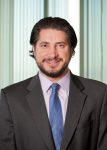1. Tell us about Nixon Peabody.
Nixon Peabody is a global law firm with attorneys representing clients in a variety of industries across major practice areas. The firm has a strong presence in California with public finance being one of its premier focus areas throughout the state. We are proud to provide public finance solutions that are innovative and community-driven.
2. As a partner at Nixon Peabody, on what types of projects do you focus?
I work on a diverse array of public financing projects including educational facilities, city enterprise facilities and transportation. I represent numerous banks and municipalities during public financing transactions.
3. How do you add value for your clients?
I have extensive experience representing municipalities and banks, so I have a unique understanding of both sides of public financing. My knowledge of both entities allows me to bridge the knowledge gaps found during public financing and avoid misunderstandings between banks and municipalities.
4. What is the most rewarding aspect of your career?
The most rewarding aspect of public finance is viewing projects being built that have a profound impact on peoples’ lives. I’ve worked to help finance schools, hospitals and clean water projects in all types of communities. It is fulfilling to know these projects are bettering so many Californians’ lives.
5. What is the most challenging aspect of your career?
The most challenging aspect is understanding government’s unique issues and constituencies and balancing those factors with banks to approve loans. This is the most challenging aspect but also where I add the most value because I can see both sides of the issues and can come up with solutions that work for both parties.
6. How has your educational background and work experience prepared you for success?
Prior to attending Georgetown University Law Center, I worked as a substitute teacher for a variety of school districts across California. My direct experience with school districts helps me understand unique challenges in public education and understanding those challenges motivates me to work hard to find solutions.
7. What’s a recent project of which you’re particularly proud?
I work on approximately 20-30 deals simultaneously so there are many from which to choose. If I must choose one, it would be the financing of the SR-247 toll road in Santa Clara Valley. Every aspect of the SR-247 public finance transaction was unique; nothing like it has been done before. I’m particularly proud of the transaction because it was completed with ease regardless of the difficulties we faced.
8. What challenges and new developments do you predict in your field?
Tax reforms are a serious challenge in the future of our field. Tax reforms can negatively impact public financing and municipalities will face a substantial challenge as key market players shift their thoughts on public financing. Loss of revenue to governments is another challenge in the field. Even while the economy is doing fine and taxes are increasing, revenues to governments are flat or declining.
9. What competitive advantages can Nixon Peabody offer to local governments and the business with which they partner?
Nixon Peabody is home to a deep bench of professionals with expertise in most areas of the law and otherwise. Our expertise and relationships extend beyond California, which allows us to provide diverse approaches to solving the ever more complex problems that municipalities face. Whether it is expertise in unique financing structures, including public-private partnerships or tax credits, or complex federal/state litigation, we have someone that can help.
10. If you could solve any transportation-related problem in the world, what would it be?
Human dependence on personal vehicles is a significant problem affecting communities worldwide. People hate traffic, and we try to avoid it as much as humanly possible. Alternatives to personal vehicles can help decrease traffic congestion and increase travel through means other than personal vehicles. There are a vast number of traffic-reducing projects in Los Angeles that are going to improve residents’ quality of life, and I’m hoping those projects are only the tip of the iceberg.


